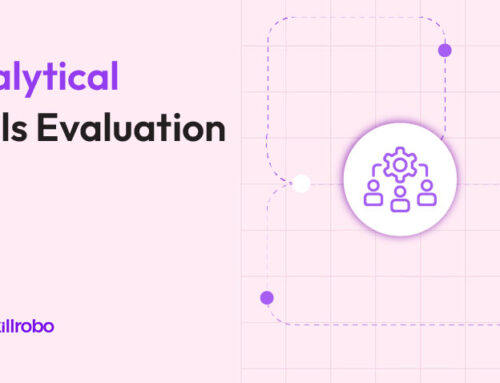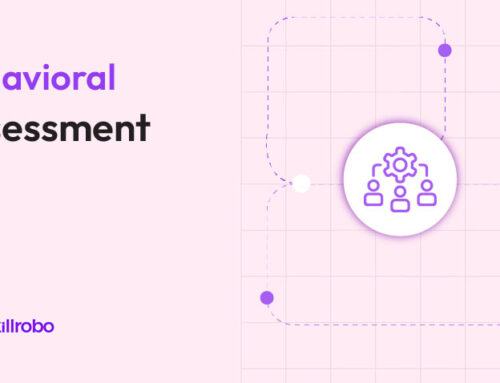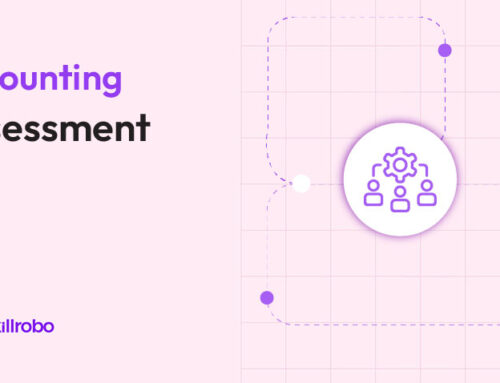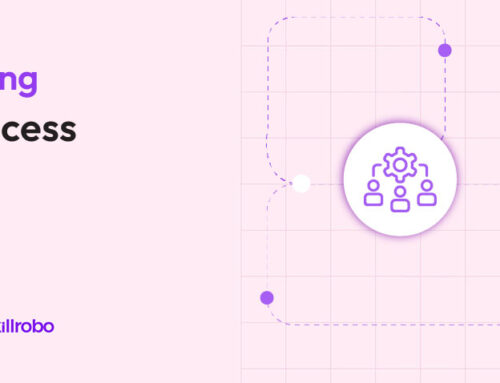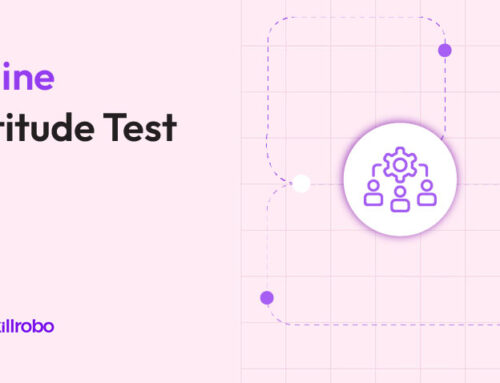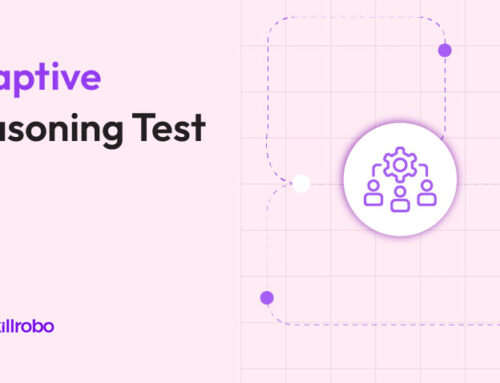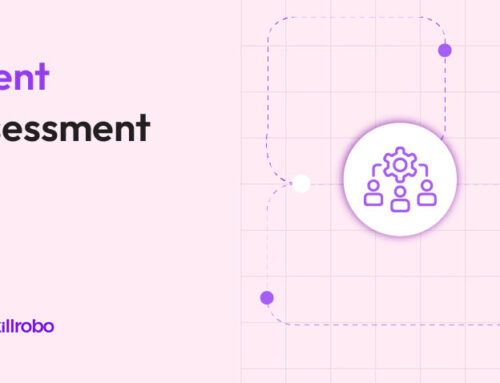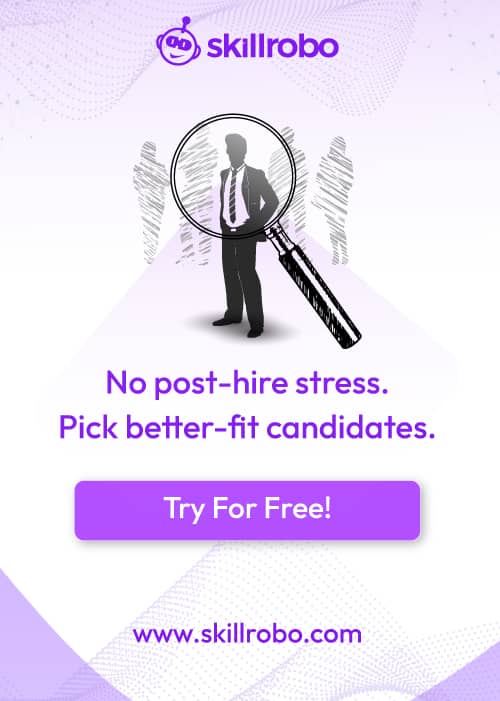Table of Contents
- Key Takeaways
- Why Competency Assessment Tools Matter in Hiring
- What is a Competency Assessment?
- Methods Of Competency Assessment
- Why Do We Need A Competency Assessment Tool?
- How Can Competency Assessment Tools Benefit Organisations?
- What To Look For In A Competency Assessment Tool?
- Top 6 Competency Assessment Tools In The Market
- Performance Appraisal Using Competency Assessment
- Ways To Assess Competencies And Performance Statements
- Conclusion
Related articles
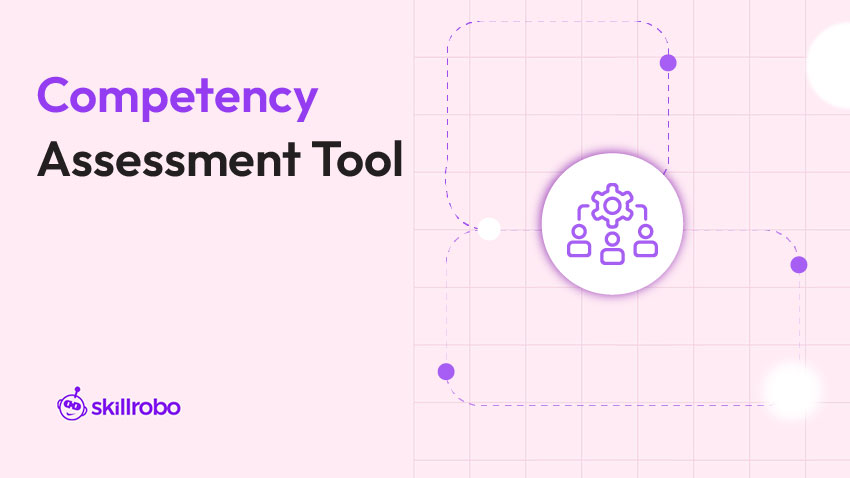
Key Takeaways
-
Competency assessment tools help recruiters identify skill gaps, strengths, and role-fit by evaluating candidates’ knowledge, behavior, and job-specific abilities.
-
These tools enhance objectivity and fairness in hiring by standardizing evaluations, reducing bias, and aligning candidate capabilities with job requirements.
-
Methods like self-assessment, manager reviews, and 360-degree feedback offer holistic insights for both employee development and recruitment.
- Skillrobo empowers hiring teams with AI-driven tests, role-based competency templates, and seamless reporting to ensure precise and scalable hiring decisions.
Why Competency Assessment Tools Matter in Hiring
Hiring top talent is a priority for every organization, but how do you identify the right fit among thousands of resumes? This is where competency assessment tools play a vital role. These tools help recruiters evaluate a candidate’s current abilities, qualifications, and potential skill gaps with greater accuracy. By increasing objectivity and reliability, they ensure fair assessments and better hiring decisions. Beyond recruitment, they also support employee development by identifying growth areas and guiding personalized training. Ultimately, competency assessment tools bridge the gap between existing capabilities and job requirements, ensuring success for both the employee and the organization.
What is a Competency Assessment?
Competency assessment is a method for assessing a person’s knowledge, skills, and abilities by specific competencies or work criteria. It mainly focuses on evaluating a person’s capacity to carry out a task or function and the probability of success in a specific position.
Increased impartiality, reliability, and validity in assessing a person’s potential for success in a given role are all advantages of employing competency assessments. Competency skills assessment tools can also assist people in identifying their areas for growth and development, which can then be utilized to create training and career development plans.
Methods Of Competency Assessment
There are three primary methods for evaluating competency through competency assessment tests. All three of these methods can be done using manual processes or software made expressly for competency evaluation purposes. They are listed below:
- Self-Assessment: The employee can evaluate their own level of competency through self-assessment.
- Manager Assessment: In this competency method, managers can determine the employee’s competency and generate analytics and reports.
- 360-degree Assessment: In this 360-degree assessment, the employee’s competency is assessed by the hiring manager, peers, and subordinates.
Why Do We Need A Competency Assessment Tool?
On the whole, competency-based evaluations are advantageous for correctly comparing knowledge, skills, and abilities to a pre-established norm. They frequently serve as the foundation for compliance or certification programs. It is not a one-way communication tool used by the company to learn about the performance or potential of a particular person.
It’s a two-way interaction that ought to be as insightful for the person being assessed as it is for the manager or HR specialist conducting it. The cornerstone of performance management can be established through competencies. Some of the most innovative and talent-hungry organizations in the world employ them. Competency management is being used by companies like Google, Nike, and American Express to attract, retain, and develop top personnel, strengthen organizational values, and promote business success.
These competency assessments can also be used to assess candidates during the recruitment process and identify the employee’s career progression. These assessments should be used uniformly throughout the organization to be efficient, fair, and legally tenable. This entails choosing a standard measurement, like competencies, and using it for every work.
The ability to objectively analyze a candidate’s competencies, skills, or knowledge is provided by the correct competency assessment technology, which can assist you in simultaneously screening a large number of applicants. To maintain the validity and defensibility of your assessment processes, it should also allow you the capacity to handle and protect test questions.
How Can Competency Assessment Tools Benefit Organisations?
Competency assessment tools assist employers in evaluating an employee’s performance in their current role and identifying how they fit into the organization.
- This tool helps employers to look beyond the individual and try to overview the entire workspace
- The competency assessment process is automated and makes assessments more timely and consistent.
- You can make better decisions about training efforts, distribute resources more effectively, and match development opportunities by assessing the competency strengths, weaknesses, and gaps across the organization, or within certain divisions or groups.
- Every competency assessment checklist is kept on file for as long as necessary and is simple to obtain when managers or auditors require it.
- The tool promotes fair and equitable assessments because it is non-discriminatory and consistent across all employees.
- You can compare an employee’s performance to a predetermined standard, such as their present role or future career goals.
- This tool enables you to compare a person’s competencies to the skills required for the given job to discover gaps that can be filled with specialized development activities.
- This allows you to evaluate employees against key organizational competencies to measure the organization’s cohesiveness or its overall ability to stand out and succeed in a market.
What To Look For In A Competency Assessment Tool?
1. Library of Competency
The competency assessment tool should enable people to be evaluated against skills and competencies. A better tool will support your current capabilities and also offer a library to help the organization.
The tool should support the definition of competencies at various levels, like beginner, intermediate, advanced, expert, etc. Role-based competency template generation will also be supported by an innovative competency assessment tool.
2. Multi-Rater Assessment Supports
Some organizations will employ managers or subject-matter specialists in the evaluation of a candidate. Employers should be able to quickly evaluate specified individuals utilizing a user-friendly online interface, thanks to a program that supports these operations. Numerous methods can be used to conduct assessments.
One is a simple self-assessment in which a person ranks oneself against a list of standards. An excellent tool should allow for more people to contribute to employee assessment software to improve accuracy and offer more helpful inputs that support multi-rater assessment.
3. Online Assessment Process
A proper competency assessment tool will offer an online interface that leads a user through the assessment process to make it simpler. It must offer all the necessary details needed for a person to assess themself or evaluate other people.
4. Learning Suggestions
The tool should have the capability to offer learning recommendations to assist someone in creating their growth plan. The learning recommendations must be tailored to each unique competency.
5. Report Generation
A competency assessment tool must offer reports to enable a person to understand their present level of competence and create a strategy for achieving their goal level. This will help people to be effective as they understand their level of competency and take measures to improve the desired level of skill.
6. Group Analysis
It is necessary to identify the group’s common weaknesses and strengths. This data will help to plan for the future of the workforce and plan for the succession that is required. Through group analysis, you can determine typical educational demands.
Companies lose the potential to group people with similar development needs and also save money on any training if people create their personal development plans on their own.
Top 6 Competency Assessment Tools In The Market
1. Skillrobo
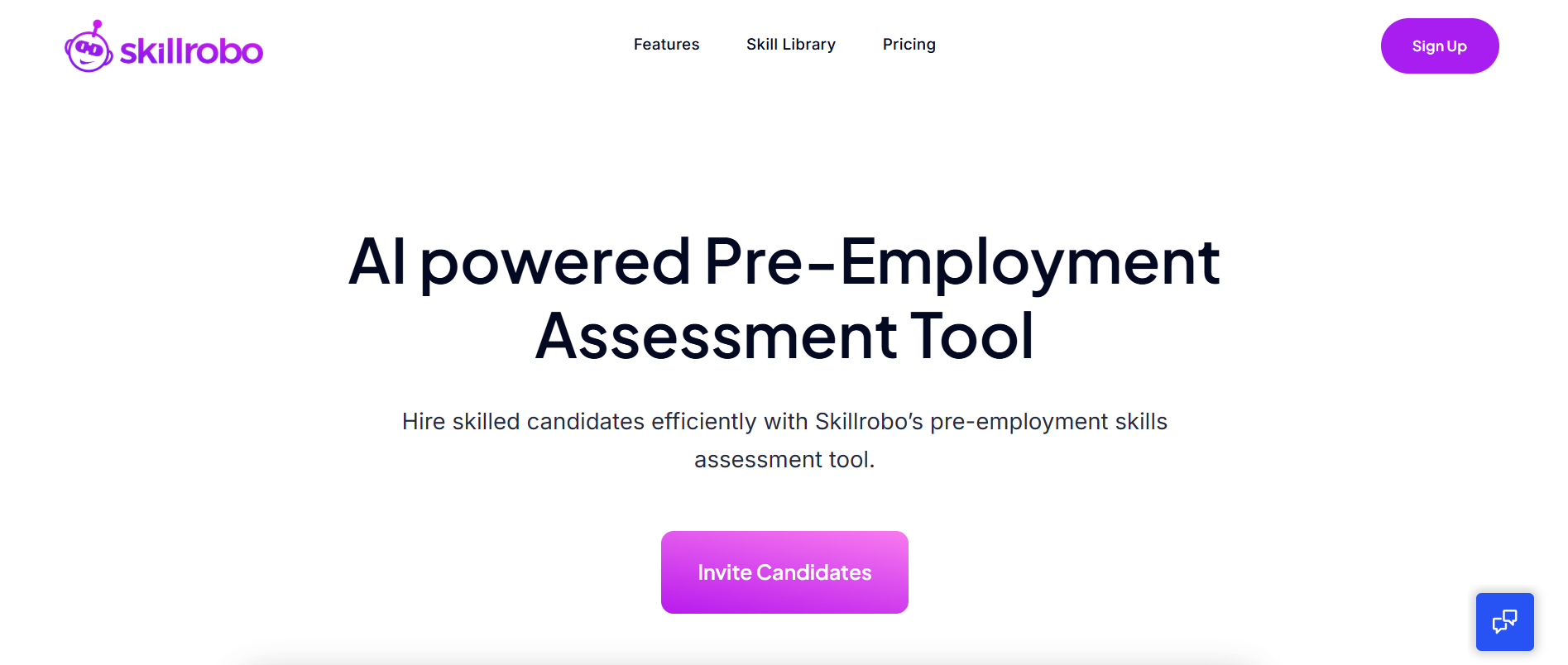
With a comprehensive range of assessments that span various skills and competencies, Skillrobo caters to the diverse needs of organizations across industries. Its validity and reliability, backed by extensive research and validation, ensure accurate and consistent measurement of competencies.
The tool’s user-friendly interface enables seamless navigation for both test-takers and administrators, enhancing the overall user experience. Moreover, Skillrobo’s customization options allow organizations to tailor assessments to their unique requirements.
Praised for its seamless integration with existing HR systems and learning management platforms, Skillrobo streamlines assessment processes for maximum efficiency.
Features
- Skillrobo helps to reduce unconscious bias in hiring.
- It promotes the development and empowerment of employees.
- It assists you in assembling a group of competent specialists that will foster growth.
- It analyzes each person’s performance in light of potential future employment.
- It enables both individual and collective reporting.
2. TalentGuard
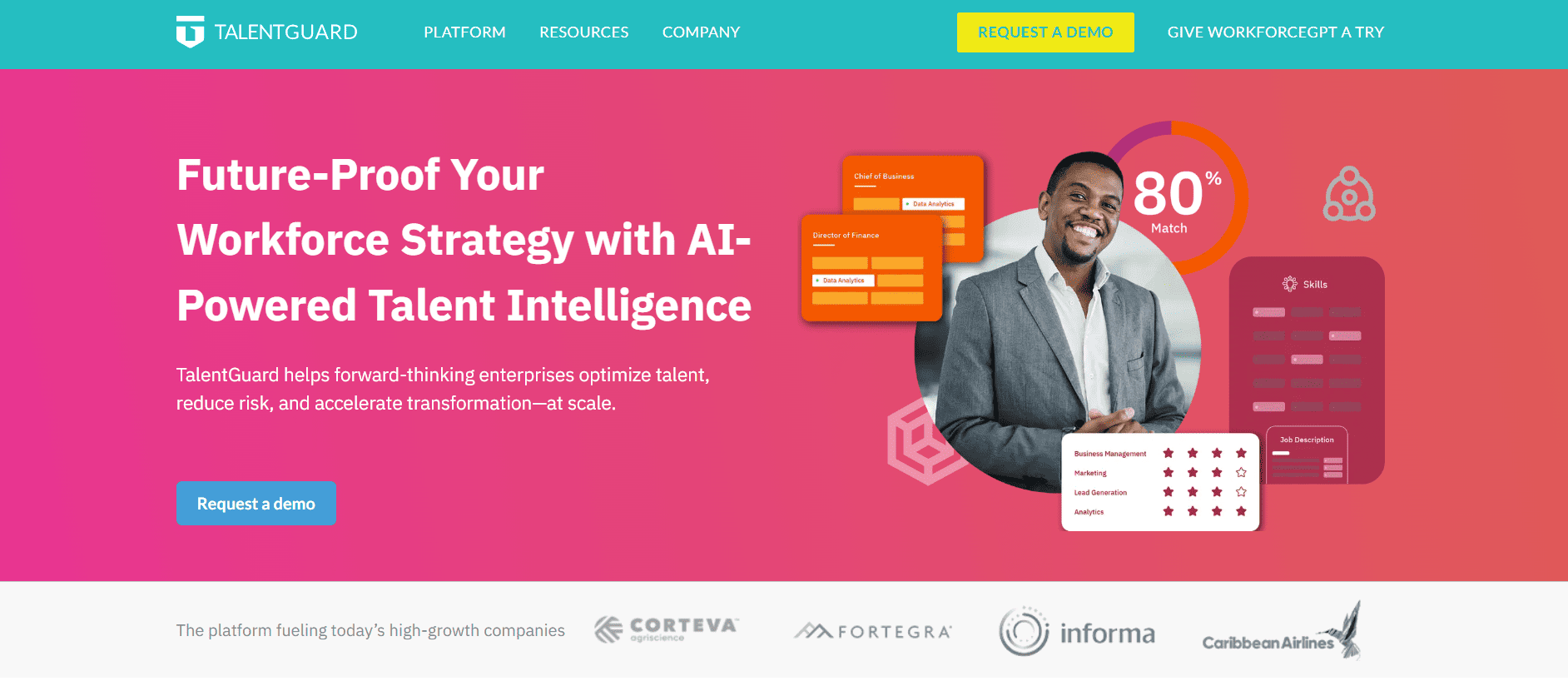
Source: TalentGuard
TalenGaurd provides a SaaS-based competency-measuring platform, which allows HR departments and recruiters to engage and retain workers. Offering a wide network of certified career advisors, training courses, and materials, it aids in improving company performance.
Features
- It provides automated performance management.
- It gives a career path and succession planning.
- It also provides 360-degree feedback
3. Cognology

Source: Cognology
A competency management system from Cognology enables you to profile your current personnel, uncover the best prospects, and pinpoint skill shortages. Each step of the competency evaluation process is made easier and more automated by Cognology, which also eliminates the need for manual labor and spreadsheets.
Features
- This tool gives automated reminders.
- Cognology competency management tools provide an easy-to-use interface.
- It helps to identify skill gaps.
4. iMocha
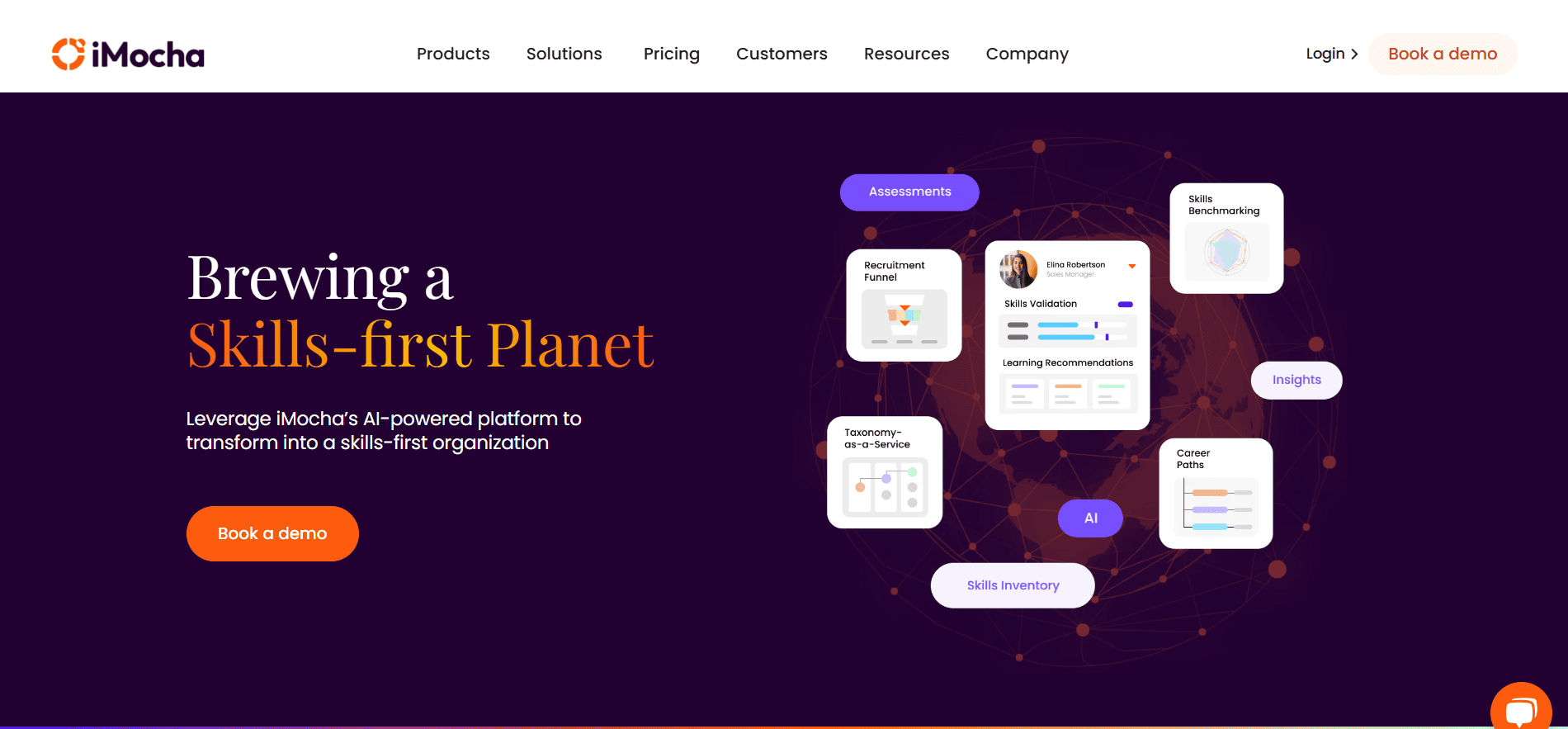
Source: iMocha
iMocha’s competency assessment tool assists in determining a candidate’s strengths and shortcomings so you may decide whether to hire them, upskill or reskill them, or otherwise develop their potential. The customizable assessment feature in them helps to focus on the specific candidate’s skill gaps.
Features
- This tool offers a vast and detailed skill library.
- iMocha competency assessment tool is easy to integrate into an existing ATS.
- It provides custom analytics and skill development features.
5. The Competency Group
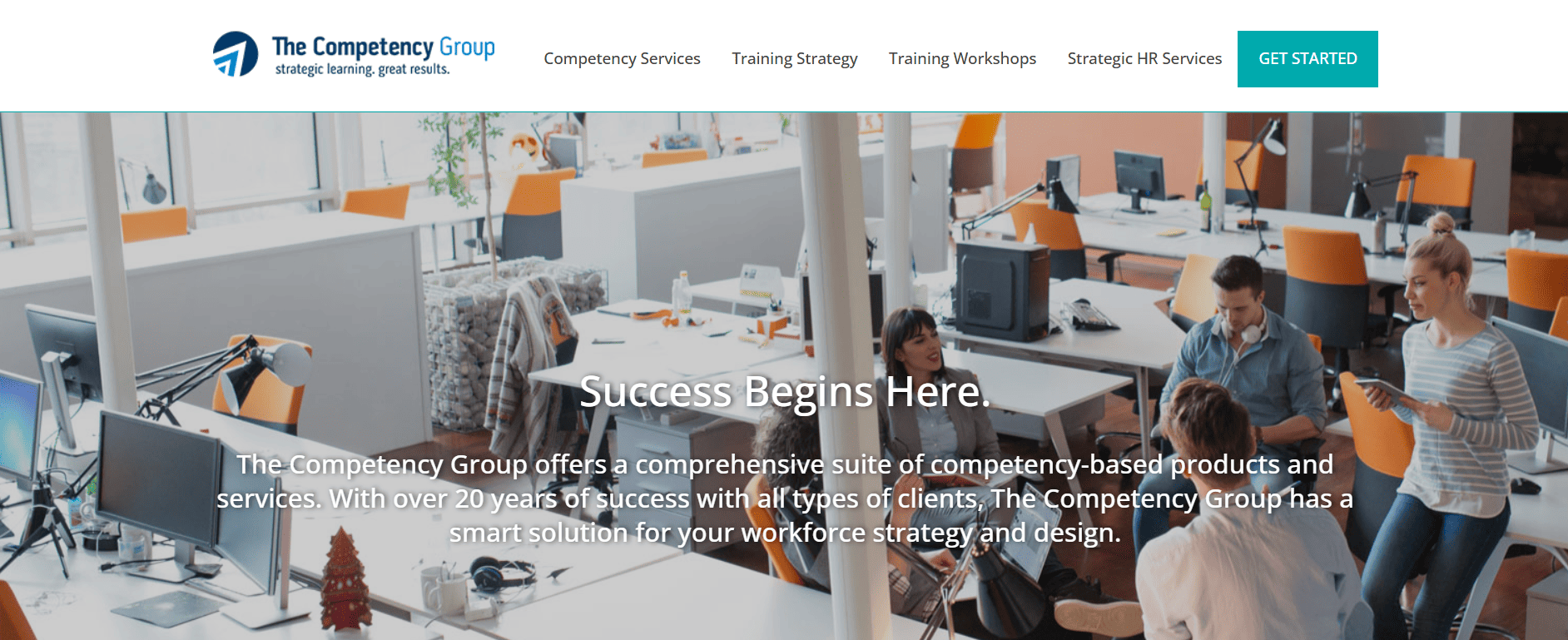
Source: The Competency Group
The Competency Group gives you a whole range of competency skill assessment tools and services. It provides a customized web solution that is a perfect match and is aware of the special needs of your organization.
Features
- It provides a wide range of competency libraries.
- It generates the candidate’s report and analytics.
- The Competency Group provides the feature of group analysis and historical trends analysis.
6. Pointerpro

Source: Pointerpro
With the aid of Pointerpro, you may construct online tests that, once finished, will produce customized reports. Pointerpro makes all of these procedures simpler, whether you want to grow your company, create leads, or save time through automation.
It lowers obstacles to completion and offers evaluation templates with mobile-optimized questionnaires for smartphones and tablets.
Features
- It has real-time reporting capabilities.
- Pointerpro allows you to set performance standards.
7. AssessTEAM
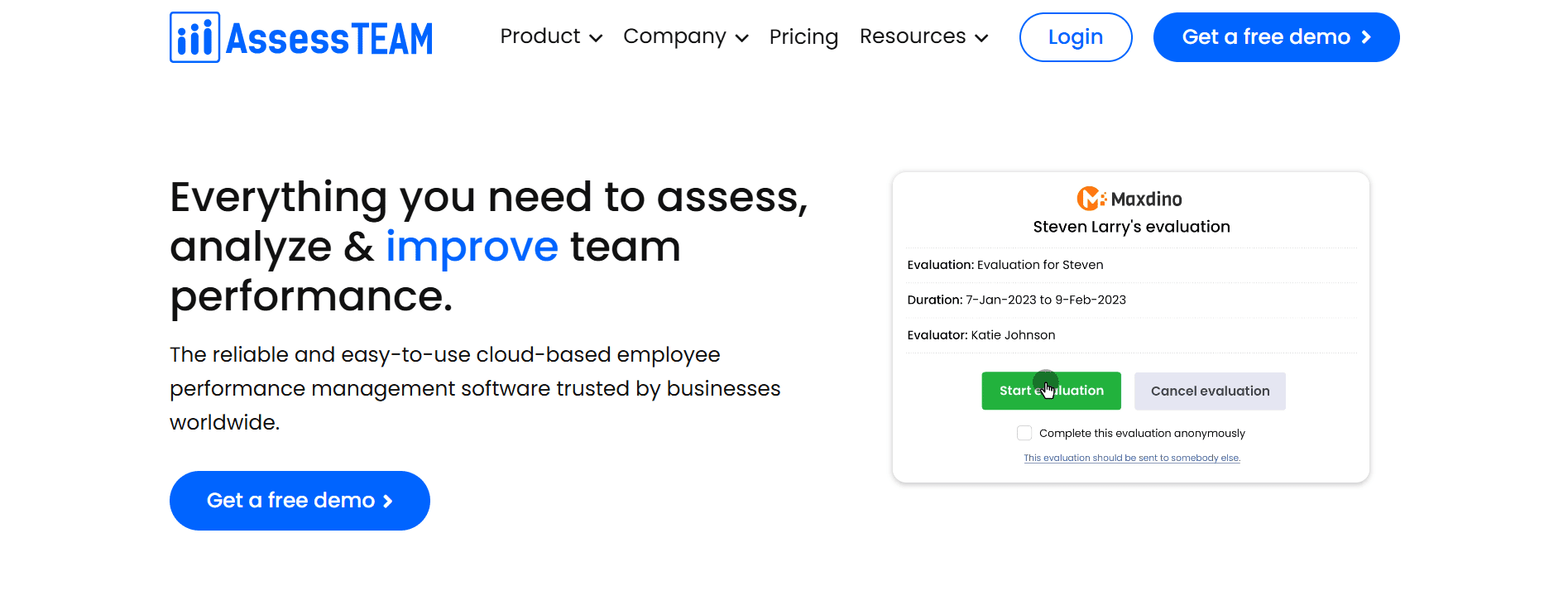
Source: AssessTEAM
AssessTEAM is a cloud-based performance management and competency assessment tool designed to help companies track employee productivity, skills, and alignment with organizational goals. It supports role-based evaluations and provides detailed insights into competency gaps across departments or individuals.
The platform enables real-time employee feedback and integrates with existing HR tools for streamlined assessment workflows. Its customizable evaluation forms allow organizations to assess both hard and soft skills with ease.
Features
- Provides competency-based job role templates and evaluation criteria.
- Delivers real-time feedback and development suggestions
- Offers powerful reporting and analytics dashboards.
- Seamlessly integrates with project management and HR systems.
- Enables mobile-based assessments and remote evaluations.
8. HireVue
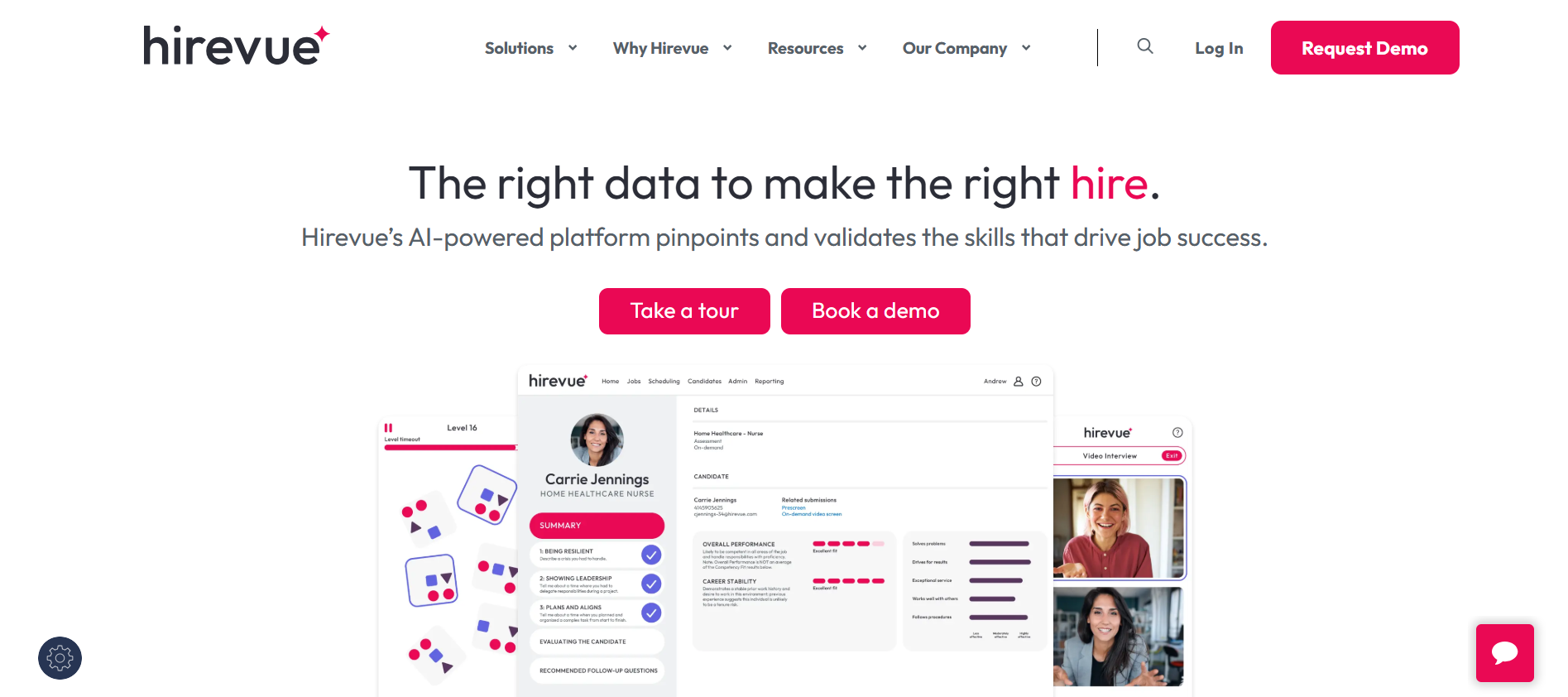
Source: HireVue
HireVue is an AI-powered talent assessment platform known for combining video interviews with structured competency-based assessments. It helps recruiters evaluate cognitive ability, emotional intelligence, and job-specific skills through on-demand testing.
The platform uses predictive analytics to shortlist candidates based on data, making the hiring process faster and more objective. HireVue is often used for high-volume hiring and leadership development programs.
Features
- AI-powered video assessments and coding tests.
- Supports structured interviews with standardized scoring.
- Includes cognitive and behavioral assessment modules.
- Offers analytics to predict candidate success and reduce bias.
- Integrates with major ATS and LMS platforms.
9. Mercer Mettl
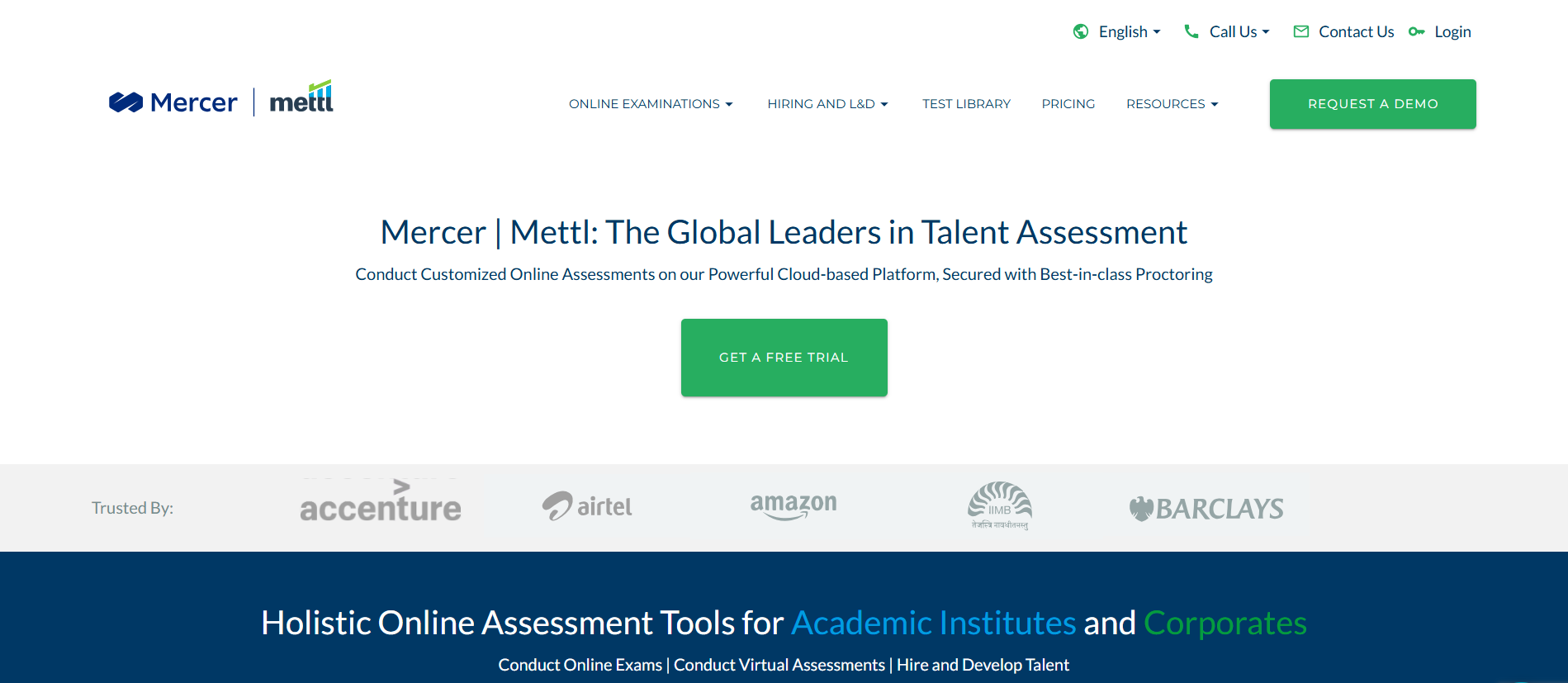
Source: Mercer Mettl
Mercer Mettl is a comprehensive online assessment tool that supports skill gap analysis, behavioral evaluations, and technical assessments. The platform includes a wide range of pre-built competency frameworks and customizable test templates for various job roles.
It’s widely used in campus hiring, lateral recruitment, and leadership assessments across industries. Mercer Mettl’s secure proctoring options make it ideal for remote evaluations.
Features
- Offers an extensive library of competency assessments.
- Provides behavioral, aptitude, and domain-specific test modules.
- Uses AI-based remote proctoring and candidate authentication.
- Delivers detailed analytics for benchmarking and improvement.
- Supports 360-degree feedback and succession planning.
10. Vervoe
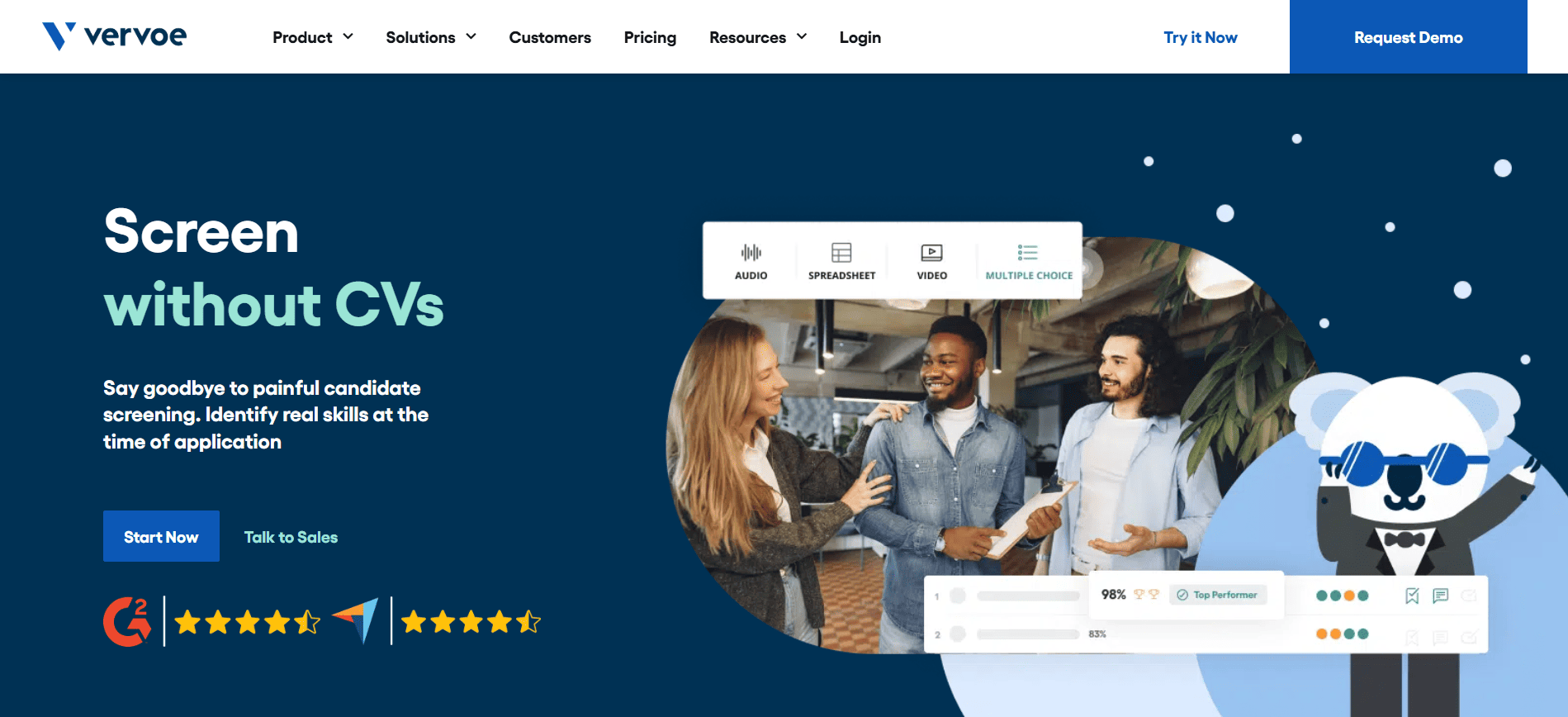
Source: Vervoe
Vervoe is a hiring platform focused on skill-based and competency assessment that simulates real-world tasks to predict job performance. It allows employers to create job simulations and test candidates on role-specific scenarios.
Vervoe uses AI to automatically grade responses based on a pre-set scoring model, reducing manual review time. The assessments are customizable and provide deep insight into how a candidate would perform in the actual job.
Features
- Enables simulation-based competency testing for real job tasks.
- Uses AI to auto-score and rank candidates.
- Offers branding customization for the candidate experience.
- Provides detailed reports for each applicant’s competencies.
- Integrates with ATS platforms and email automation tools.
Performance Appraisal Using Competency Assessment
Several talent management procedures use competency-based assessments, including
- These assessments are used to assess the qualifications of applicants for jobs at the organization.
- They can be applied while deciding whether to promote or transfer a team member.
- They can be used in combination with performance reviews to assess the competency of present employees.
Ways To Assess Competencies And Performance Statements
- Resource Management – The employees should tend to utilize the organizational resources more effectively and responsibly.
- Teamwork – Should effectively interact with members of interdisciplinary teams, should understand the importance of each team member’s work, and listen and consider others’ point of view helps to collaborate with the team quickly.
- Communication – When there is a situation of sharing sensitive or difficult topics to convey with the team members and clients, the person should be able to communicate effectively.
- Customer Support – The candidate can satisfy customer demands, approach problems with a client-focused attitude, and see creative methods to enhance the customer experience.
Conclusion
A competency-based self-assessment is an employee-driven exercise that enables people to consider how their competencies, knowledge, skills, and abilities compare with the needs of a particular job or with a fundamental set of organizational capabilities.
Utilizing competence assessments to make sure that you only hire applicants who have the required abilities for the position is the best approach to do this. The employer must determine the applicants based on the competency they have in the essential skills that are required to fulfill the job role effectively.
To make the greatest hire, you must assess each candidate’s proficiency in the crucial abilities needed to complete the job successfully. This assessment can help filter out the non-capable applicants right away and save you a lot of time. One of the greatest ways to ensure that you hire qualified individuals is through competency-based recruitment.
Skillrobo’s pre-employment assessment tool helps you in this stage by providing the competency and assessment tools you need to implement specialized job-based tests that gauge an employee’s level of proficiency in the skills most important to their position.
Click here to Sign Up for Skillrobo!

Key Takeaways
-
Competency assessment tools help recruiters identify skill gaps, strengths, and role-fit by evaluating candidates’ knowledge, behavior, and job-specific abilities.
-
These tools enhance objectivity and fairness in hiring by standardizing evaluations, reducing bias, and aligning candidate capabilities with job requirements.
-
Methods like self-assessment, manager reviews, and 360-degree feedback offer holistic insights for both employee development and recruitment.
- Skillrobo empowers hiring teams with AI-driven tests, role-based competency templates, and seamless reporting to ensure precise and scalable hiring decisions.
Why Competency Assessment Tools Matter in Hiring
Hiring top talent is a priority for every organization, but how do you identify the right fit among thousands of resumes? This is where competency assessment tools play a vital role. These tools help recruiters evaluate a candidate’s current abilities, qualifications, and potential skill gaps with greater accuracy. By increasing objectivity and reliability, they ensure fair assessments and better hiring decisions. Beyond recruitment, they also support employee development by identifying growth areas and guiding personalized training. Ultimately, competency assessment tools bridge the gap between existing capabilities and job requirements, ensuring success for both the employee and the organization.
What is a Competency Assessment?
Competency assessment is a method for assessing a person’s knowledge, skills, and abilities by specific competencies or work criteria. It mainly focuses on evaluating a person’s capacity to carry out a task or function and the probability of success in a specific position.
Increased impartiality, reliability, and validity in assessing a person’s potential for success in a given role are all advantages of employing competency assessments. Competency skills assessment tools can also assist people in identifying their areas for growth and development, which can then be utilized to create training and career development plans.
Methods Of Competency Assessment
There are three primary methods for evaluating competency through competency assessment tests. All three of these methods can be done using manual processes or software made expressly for competency evaluation purposes. They are listed below:
- Self-Assessment: The employee can evaluate their own level of competency through self-assessment.
- Manager Assessment: In this competency method, managers can determine the employee’s competency and generate analytics and reports.
- 360-degree Assessment: In this 360-degree assessment, the employee’s competency is assessed by the hiring manager, peers, and subordinates.
Why Do We Need A Competency Assessment Tool?
On the whole, competency-based evaluations are advantageous for correctly comparing knowledge, skills, and abilities to a pre-established norm. They frequently serve as the foundation for compliance or certification programs. It is not a one-way communication tool used by the company to learn about the performance or potential of a particular person.
It’s a two-way interaction that ought to be as insightful for the person being assessed as it is for the manager or HR specialist conducting it. The cornerstone of performance management can be established through competencies. Some of the most innovative and talent-hungry organizations in the world employ them. Competency management is being used by companies like Google, Nike, and American Express to attract, retain, and develop top personnel, strengthen organizational values, and promote business success.
These competency assessments can also be used to assess candidates during the recruitment process and identify the employee’s career progression. These assessments should be used uniformly throughout the organization to be efficient, fair, and legally tenable. This entails choosing a standard measurement, like competencies, and using it for every work.
The ability to objectively analyze a candidate’s competencies, skills, or knowledge is provided by the correct competency assessment technology, which can assist you in simultaneously screening a large number of applicants. To maintain the validity and defensibility of your assessment processes, it should also allow you the capacity to handle and protect test questions.
How Can Competency Assessment Tools Benefit Organisations?
Competency assessment tools assist employers in evaluating an employee’s performance in their current role and identifying how they fit into the organization.
- This tool helps employers to look beyond the individual and try to overview the entire workspace
- The competency assessment process is automated and makes assessments more timely and consistent.
- You can make better decisions about training efforts, distribute resources more effectively, and match development opportunities by assessing the competency strengths, weaknesses, and gaps across the organization, or within certain divisions or groups.
- Every competency assessment checklist is kept on file for as long as necessary and is simple to obtain when managers or auditors require it.
- The tool promotes fair and equitable assessments because it is non-discriminatory and consistent across all employees.
- You can compare an employee’s performance to a predetermined standard, such as their present role or future career goals.
- This tool enables you to compare a person’s competencies to the skills required for the given job to discover gaps that can be filled with specialized development activities.
- This allows you to evaluate employees against key organizational competencies to measure the organization’s cohesiveness or its overall ability to stand out and succeed in a market.
What To Look For In A Competency Assessment Tool?
1. Library of Competency
The competency assessment tool should enable people to be evaluated against skills and competencies. A better tool will support your current capabilities and also offer a library to help the organization.
The tool should support the definition of competencies at various levels, like beginner, intermediate, advanced, expert, etc. Role-based competency template generation will also be supported by an innovative competency assessment tool.
2. Multi-Rater Assessment Supports
Some organizations will employ managers or subject-matter specialists in the evaluation of a candidate. Employers should be able to quickly evaluate specified individuals utilizing a user-friendly online interface, thanks to a program that supports these operations. Numerous methods can be used to conduct assessments.
One is a simple self-assessment in which a person ranks oneself against a list of standards. An excellent tool should allow for more people to contribute to employee assessment software to improve accuracy and offer more helpful inputs that support multi-rater assessment.
3. Online Assessment Process
A proper competency assessment tool will offer an online interface that leads a user through the assessment process to make it simpler. It must offer all the necessary details needed for a person to assess themself or evaluate other people.
4. Learning Suggestions
The tool should have the capability to offer learning recommendations to assist someone in creating their growth plan. The learning recommendations must be tailored to each unique competency.
5. Report Generation
A competency assessment tool must offer reports to enable a person to understand their present level of competence and create a strategy for achieving their goal level. This will help people to be effective as they understand their level of competency and take measures to improve the desired level of skill.
6. Group Analysis
It is necessary to identify the group’s common weaknesses and strengths. This data will help to plan for the future of the workforce and plan for the succession that is required. Through group analysis, you can determine typical educational demands.
Companies lose the potential to group people with similar development needs and also save money on any training if people create their personal development plans on their own.
Top 6 Competency Assessment Tools In The Market
1. Skillrobo

With a comprehensive range of assessments that span various skills and competencies, Skillrobo caters to the diverse needs of organizations across industries. Its validity and reliability, backed by extensive research and validation, ensure accurate and consistent measurement of competencies.
The tool’s user-friendly interface enables seamless navigation for both test-takers and administrators, enhancing the overall user experience. Moreover, Skillrobo’s customization options allow organizations to tailor assessments to their unique requirements.
Praised for its seamless integration with existing HR systems and learning management platforms, Skillrobo streamlines assessment processes for maximum efficiency.
Features
- Skillrobo helps to reduce unconscious bias in hiring.
- It promotes the development and empowerment of employees.
- It assists you in assembling a group of competent specialists that will foster growth.
- It analyzes each person’s performance in light of potential future employment.
- It enables both individual and collective reporting.
2. TalentGuard

Source: TalentGuard
TalenGaurd provides a SaaS-based competency-measuring platform, which allows HR departments and recruiters to engage and retain workers. Offering a wide network of certified career advisors, training courses, and materials, it aids in improving company performance.
Features
- It provides automated performance management.
- It gives a career path and succession planning.
- It also provides 360-degree feedback
3. Cognology

Source: Cognology
A competency management system from Cognology enables you to profile your current personnel, uncover the best prospects, and pinpoint skill shortages. Each step of the competency evaluation process is made easier and more automated by Cognology, which also eliminates the need for manual labor and spreadsheets.
Features
- This tool gives automated reminders.
- Cognology competency management tools provide an easy-to-use interface.
- It helps to identify skill gaps.
4. iMocha

Source: iMocha
iMocha’s competency assessment tool assists in determining a candidate’s strengths and shortcomings so you may decide whether to hire them, upskill or reskill them, or otherwise develop their potential. The customizable assessment feature in them helps to focus on the specific candidate’s skill gaps.
Features
- This tool offers a vast and detailed skill library.
- iMocha competency assessment tool is easy to integrate into an existing ATS.
- It provides custom analytics and skill development features.
5. The Competency Group

Source: The Competency Group
The Competency Group gives you a whole range of competency skill assessment tools and services. It provides a customized web solution that is a perfect match and is aware of the special needs of your organization.
Features
- It provides a wide range of competency libraries.
- It generates the candidate’s report and analytics.
- The Competency Group provides the feature of group analysis and historical trends analysis.
6. Pointerpro

Source: Pointerpro
With the aid of Pointerpro, you may construct online tests that, once finished, will produce customized reports. Pointerpro makes all of these procedures simpler, whether you want to grow your company, create leads, or save time through automation.
It lowers obstacles to completion and offers evaluation templates with mobile-optimized questionnaires for smartphones and tablets.
Features
- It has real-time reporting capabilities.
- Pointerpro allows you to set performance standards.
7. AssessTEAM

Source: AssessTEAM
AssessTEAM is a cloud-based performance management and competency assessment tool designed to help companies track employee productivity, skills, and alignment with organizational goals. It supports role-based evaluations and provides detailed insights into competency gaps across departments or individuals.
The platform enables real-time employee feedback and integrates with existing HR tools for streamlined assessment workflows. Its customizable evaluation forms allow organizations to assess both hard and soft skills with ease.
Features
- Provides competency-based job role templates and evaluation criteria.
- Delivers real-time feedback and development suggestions
- Offers powerful reporting and analytics dashboards.
- Seamlessly integrates with project management and HR systems.
- Enables mobile-based assessments and remote evaluations.
8. HireVue

Source: HireVue
HireVue is an AI-powered talent assessment platform known for combining video interviews with structured competency-based assessments. It helps recruiters evaluate cognitive ability, emotional intelligence, and job-specific skills through on-demand testing.
The platform uses predictive analytics to shortlist candidates based on data, making the hiring process faster and more objective. HireVue is often used for high-volume hiring and leadership development programs.
Features
- AI-powered video assessments and coding tests.
- Supports structured interviews with standardized scoring.
- Includes cognitive and behavioral assessment modules.
- Offers analytics to predict candidate success and reduce bias.
- Integrates with major ATS and LMS platforms.
9. Mercer Mettl

Source: Mercer Mettl
Mercer Mettl is a comprehensive online assessment tool that supports skill gap analysis, behavioral evaluations, and technical assessments. The platform includes a wide range of pre-built competency frameworks and customizable test templates for various job roles.
It’s widely used in campus hiring, lateral recruitment, and leadership assessments across industries. Mercer Mettl’s secure proctoring options make it ideal for remote evaluations.
Features
- Offers an extensive library of competency assessments.
- Provides behavioral, aptitude, and domain-specific test modules.
- Uses AI-based remote proctoring and candidate authentication.
- Delivers detailed analytics for benchmarking and improvement.
- Supports 360-degree feedback and succession planning.
10. Vervoe

Source: Vervoe
Vervoe is a hiring platform focused on skill-based and competency assessment that simulates real-world tasks to predict job performance. It allows employers to create job simulations and test candidates on role-specific scenarios.
Vervoe uses AI to automatically grade responses based on a pre-set scoring model, reducing manual review time. The assessments are customizable and provide deep insight into how a candidate would perform in the actual job.
Features
- Enables simulation-based competency testing for real job tasks.
- Uses AI to auto-score and rank candidates.
- Offers branding customization for the candidate experience.
- Provides detailed reports for each applicant’s competencies.
- Integrates with ATS platforms and email automation tools.
Performance Appraisal Using Competency Assessment
Several talent management procedures use competency-based assessments, including
- These assessments are used to assess the qualifications of applicants for jobs at the organization.
- They can be applied while deciding whether to promote or transfer a team member.
- They can be used in combination with performance reviews to assess the competency of present employees.
Ways To Assess Competencies And Performance Statements
- Resource Management – The employees should tend to utilize the organizational resources more effectively and responsibly.
- Teamwork – Should effectively interact with members of interdisciplinary teams, should understand the importance of each team member’s work, and listen and consider others’ point of view helps to collaborate with the team quickly.
- Communication – When there is a situation of sharing sensitive or difficult topics to convey with the team members and clients, the person should be able to communicate effectively.
- Customer Support – The candidate can satisfy customer demands, approach problems with a client-focused attitude, and see creative methods to enhance the customer experience.
Conclusion
A competency-based self-assessment is an employee-driven exercise that enables people to consider how their competencies, knowledge, skills, and abilities compare with the needs of a particular job or with a fundamental set of organizational capabilities.
Utilizing competence assessments to make sure that you only hire applicants who have the required abilities for the position is the best approach to do this. The employer must determine the applicants based on the competency they have in the essential skills that are required to fulfill the job role effectively.
To make the greatest hire, you must assess each candidate’s proficiency in the crucial abilities needed to complete the job successfully. This assessment can help filter out the non-capable applicants right away and save you a lot of time. One of the greatest ways to ensure that you hire qualified individuals is through competency-based recruitment.
Skillrobo’s pre-employment assessment tool helps you in this stage by providing the competency and assessment tools you need to implement specialized job-based tests that gauge an employee’s level of proficiency in the skills most important to their position.
Click here to Sign Up for Skillrobo!



